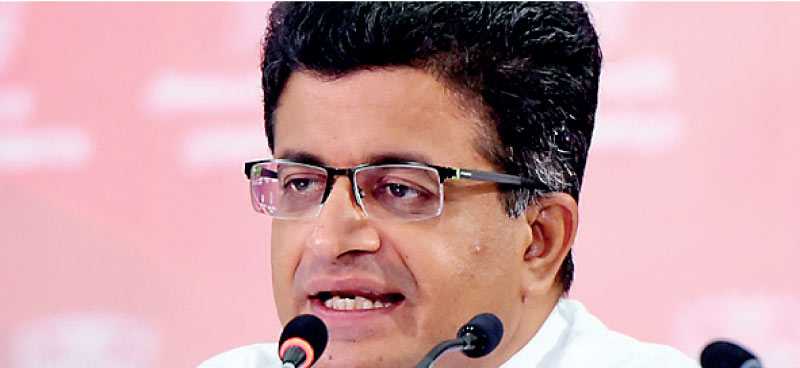Wednesday Feb 25, 2026
Wednesday Feb 25, 2026
Wednesday, 31 March 2021 03:38 - - {{hitsCtrl.values.hits}}

Cabinet Co-Spokesman and Energy Minister Udaya Gammanpila
By Uditha Jayasinghe
The Government yesterday defended the decision to give sweeping tax concessions and other incentives to attract investment to the $ 1.4 billion Port City, insisting it would be a catalyst for greater economic growth for Sri Lanka.
Cabinet Co-Spokesman and Energy Minister Udaya Gammanpila, responding to questions at the weekly Cabinet briefing, spoke in support of Government plans to grant the Colombo Port City Economic Commission the power to give its own tax breaks running up to 40 years for investments that are defined as a “Businesses of Strategic Importance.”
“The Port City, which will include the Colombo International Financial City, is the largest foreign direct investment project in Sri Lanka’s history. It was envisioned in line with the former Mahinda Rajapaksa Government’s policy framework to use Sri Lanka’s geographical location to make it into a regional hub for financial services, logistics, energy and other sectors. This is an important step in Sri Lanka’s economic growth aspirations and will be a platform for greater development,” Minister Gammanpila said.
He also reassured that the public need not be concerned of the powers wielded by the Port City Economic Commission as it will be made up of officials handpicked by the President and therefore well able to carry out the tasks entrusted to them while safeguarding the interests of Sri Lanka.
“Successive governments have supported crucial investment in Sri Lanka by providing tax incentives. The Port City will be in competition with other international financial centres in Dubai, Hong Kong and elsewhere. So, it is necessary to give it the support needed to stand out,” he said, pointing out that investment to the Chinese-funded venture will support overall growth as well.
Once approved by Parliament, the Port City Commission will be empowered to give exemptions to businesses from income tax, value added tax, excise tax, debit tax, customs duties, ports and airport levy, Sri Lanka Export Development Act levies, Betting and Gaming casino laws and labour laws. Incentives already given under the Strategic Development Act will automatically be deemed to have been given by the Economic Commission.
The Bill, which was gazetted earlier this week, also exempts businesses from a number of laws, including an exchange control law in its area of authority. In the first five years after the law is enacted, the Port City Commission could also permit people to “engage in business from a designated location in Sri Lanka, outside the Area of Authority of the Colombo Port City, as may be approved by the President,” or the minister-in-charge.
Seven key laws will also have no application within the area of authority of the CPC. These include the Urban Development Authority Act No. 41 of 1978, the Municipal Council Ordinance (Chapter 252), the Commercial Mediation Centre of Sri Lanka Act No. 44 of 2000, the Town and Country Planning Ordinance (Chapter 269), the Strategic Development Projects Act No. 14 of 2008, Public Contracts Act No. 3 of 1987, and the Board of Investment of Sri Lanka Law No. 4 of 1978.
During the presentation of Budget 2021, Prime Minister Mahinda Rajapaksa said the relevant legislation would be presented to Parliament by January but this has been beset by several delays. It is now expected to be presented in parliament next month.
The Colombo Port City is projected to contribute $ 11.8 billion to Sri Lanka’s economy per annum upon completion, according to an independent study carried out by PricewaterhouseCoopers.
The Bill will pave the way for the Colombo Port City to be developed as a Specialised Economic Centre with a wide scope of service to the Indian subcontinent and Southeast Asia, and function as a regional hub aimed at a service economy in line with the Government’s ‘Vistas of Prosperity and Splendour’ Policy Statement.
Cabinet in January agreed that for this purpose, it was necessary to create an active environment that could compete with investment hubs such as Dubai, Singapore and Hong Kong, by attracting investors, entrepreneurs, innovators, companies, financial institutions through a well-structured and competitive legal, tax and regulatory, and dispute resolution mechanism.
The Port City is made up of 269 hectares of reclaimed land, which has now been officially vested as part of Sri Lanka. Of the 269 hectares, 116 hectares belong to the China Communications Construction Company (CCCC), which is the parent company of China Harbour Engineering Company (CHEC), on a 99-year lease. The remaining land is owned by the Sri Lankan Government, and will be divided up into 62 hectares, to be used to set up a financial city, and 91 hectares to be used as public spaces.
Cabinet last year gave approval for a $ 1 billion mixed development project to be established, which is the first large scale investment approved for the project.